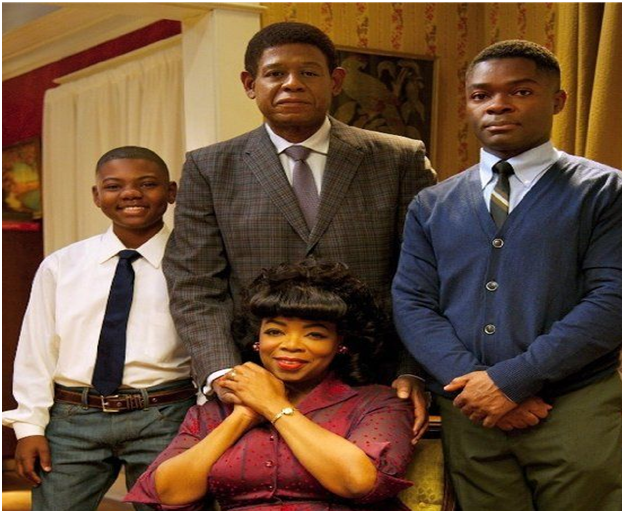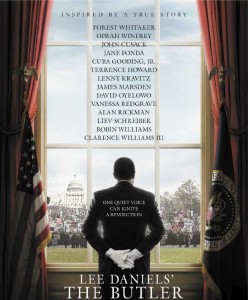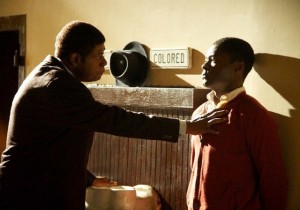Last Saturday, the Mrs. and I saw Lee Daniels’ – The Butler. Hands down…best movie of the year! I got it winning Best Male Actor, Best Female Actress, Best Director, and Best Movie.
I saw it on the weekend of the 50th anniversary of the March on Washington. So it had an even more significant meaning. As I watched the movie, I marveled at what black men and women of that generation were force to go through. I can’t ignore what our forebears sacrifice to allow me to sit here in Barnes and Noble, sip on bottled water, and eat a cupcake in the suburb of Washington, DC. un-accosted.
Several days have passed since I saw the movie. In its wake, I’ve been thinking about some of the leadership implications for families in the movie. As you know by now, I believe there is a moral obligation for men to take on leadership roles in their relationships – both from a spiritual and social aspect. While watching The Butler, I was both heartened and disheartened at some of the examples of leadership I saw play out in this adaptation of the lives of these, our now heralded heroes. Here are 5 leadership-lessons for families I took away from the movie.
(I hate when people tell me about a movie before I see it. So heads-up…I will be talking about some scenes from the movie…but won’t be giving up too much detail. So if you haven’t seen it…read at your own risk.)
1) Have a plan for your life, your wife, and your children
Cecil (played by Forrest Whitaker) had a very traumatic childhood growing up on a cotton plantation in the 1930’s. From his experience there, he knew that plantation was no place for him to grow up. So he set out to build a life elsewhere. Fast-forward to a wife, two children, and a house in D.C. later, Cecil worked hard to provide for his family. He made plans for his children to go to college…and had the means to pay for it when the time came for his oldest son to go to Fisk University. Cecil was a great provider financially.
Husbands should proactively make plans to financially provide for their family’s needs…both in the present and in the future. This is the bare minimum a man must do! I’m not saying that he has to make more money than his wife…because in some families the wife makes more money (Luscombe, 2010). However the husband must be responsible for ensuring monies and resources are set aside and properly allocated to make sure the family is provided for. And if money is short…as it sometimes is, have a plan for what to do. This is what leaders do. So whoever does it…that person is the leader. Men…make sure you’re that person!
2) Being a financial provider isn’t enough in this day and age
Cecil isn’t a good example for husbands for today’s generation of men. Here’s why. Back in the day, if a man provided for his family’s financial needs, he was considered a good man – a good provider. Little else was required from him. But today’s standards are much higher to qualify as a good man. Hard working men that provide for their families are getting divorced all the time. That’s because marriage requires more than just money. Communication is essential – as evidence by many reports citing communication as one of the main reasons for divorce (YourTango, 2013; Doss, Simpson, & Christensen, 2004). Male-withdrawal is also a no-no (Roberts & Krokoff, 1990), even though it’s used by some as a default coping mechanism when men don’t want to…or don’t know how to…deal with a problem in their relationship.
Cecil was guilty of both of them. He sometimes withdrew into his work when faced with tricky family issues. And when pressed by his wife, Gloria (played by Oprah), to talk to her about her unhappiness, he shutdown, disconnected, and went to sleep.
Nowadays, men must communicate their thoughts and feelings to their wives about tricky situations…even when they don’t want to. Because men generally aren’t closely connected to the mushy-feelings-side of their emotions – we relate more to the logical and judgment side of the brain, we may not put words together fast enough to express how we really feel as fast as our wives would like. Sometimes shutting down is our way of processing. But men, unlike Cecil, we have to do better at communicating. Regardless of how good a communicator you think you are. Better implies there’s room for improvement. So get to improving.
3) You can only lead willing followers
I thought Cecil’s relationship with his son Louis was a great picture of leadership. It showed the highs and lows. In the beginning, you could tell there was something ‘not right’ between Cecil and Louis. As Louis got older, the distance between them grew further apart. So by the time Louis went to college, they could barely say good-bye to each other.
Now out of the house, Louis started doing what he wanted to do, which was the exact opposite of what his father wanted him to do. Cecil could no longer control his son. This dismantling of Cecil’s leadership was caused by a violation of the second principle of an organization that is required for leadership. In order for leadership to exist, there must be 1) two or more people, 2) a common goal, and 3) different roles and responsibilities that lead toward accomplishing that common goal. When Louis started participating in the Freedom Rides, his father demanded that he stop and go back to school. For, that was the common goal they both shared. But Louis continued to participate in the Freedom Rides. Thus, there was no longer a common goal shared between the two of them. Louis had his own goals now. Since there was no common goal, there was no longer any leadership Cecil could provide to his son, Louis. And this was played out dramatically at the dinner table when Louis brought home his girlfriend Carol for dinner (I won’t spoil it for you if you haven’t seen it. That was the best scene in the whole movie!).
As long as you have a common goal your family is striving towards, there will be a need for someone to provide leadership. But once that common goal disappears, or if that common goal never appears at all, leadership is dead. So if you and your spouse have different goals, you will never be able to provide leadership toward a non-existing goal. Or if you and your teenage/young adult child have different goals for their lives, regardless how hard you try, you will never be able to lead them to accomplish a goal they are dead-set on not accomplishing.
4) Anyone can be a leader
I almost teared-up (almost) when the estranged father and son re-connected during the Apartheid protest. It took an eye-opening event of being invited as a guest to a White House state dinner to see why his son pursued the path he was so opposed to him pursuing. I found it ironic that the tides had been turned. The father was now following the son’s lead in protesting against South Africa. They had a new common goal they could pursue together…so leadership was again present. But this time it was the son leading – not the father. This goes to show that leadership is not person-specific or purpose-specific. Anyone can be a leader…to anything – as long as there is a common goal and different roles and responsibilities that lead towards accomplishing that goal.
5) Good leaders are open to different ideas from their followers
Part of being a good leader is to be open to the voices, opinions, and ideas of your followers. You can still be a leader if you don’t do this. But you might be met with the same opposition Cecil was met with from his son, which fractured their relationship for decades. I truly wish Cecil would have been empathetic to his son’s chosen path sooner. Even though he didn’t agree, I was sad to see their difference of opinion caused a father to be without his son and vice-versa…for decades.
Spouses and parents, try to show empathy when your spouse/children choose a path that you didn’t choose for them…even if you know it is the completely wrong decision. You don’t have to understand, like it, or even help them do it. But at least accept their right to make that horribly wrong decision. And love them anyway. In working with married couples in church and our business, the Family Bootcamp, I’ve seen spouses try to prevent their mate from doing something…only for their spouse to do it anyway. And we just watched helplessly as their relationships took a major downward spiral. Sometimes you just have to allow them make a bad decision…and live with the consequences. My wife and I live by this motto, ‘you can’t make grown folk do what they don’t wanna do.’ The quicker we accept that, the easier it is to accept that you can’t live people’s lives for them. You have to let them live and learn their own way…and love them throughout their journey.
I try to learn from life…even if the life is not my own. In the movie, The Butler, the commemoration of the March on Washington, and the 50th anniversary of Dr. MLK’s speech, I learned some great leadership-life-lessons that had a profound impact on me this weekend. If you saw it, what leadership-life-lessons…or just a life-lessons in general did you get from the movie or the weekend events?




 Follow
Follow